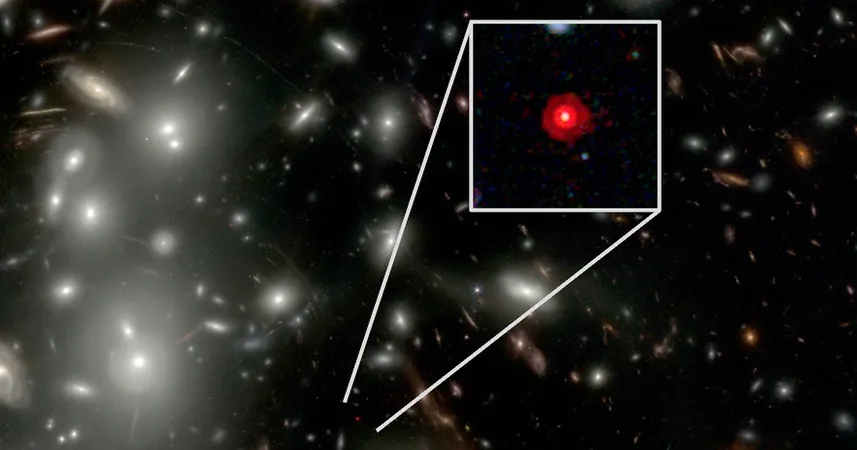
Astronomers Unveil Breathtaking Discovery: The Oldest Black Hole Born Moments After the Big Bang!
2025-09-07
Author: Ying
A Groundbreaking Revelation in Cosmic Origins
Amazingly, astronomers leveraging the capabilities of the James Webb Space Telescope have potentially located the universe's oldest black hole, astonishingly formed less than one second after the Big Bang. This revelation comes from a new study currently awaiting peer review and could provide critical insight into the existence of primordial black holes, a concept that has baffled scientists for decades.
Understanding Primordial Black Holes
Unlike the supermassive black holes we usually see today, which emerge from the collapse of giant stars, these primordial black holes may be much smaller—possibly as small as planets or even atoms. They are theorized to have formed in the universe's infancy, during a time when stars and galaxies hadn't yet coalesced. This challenges our longstanding beliefs about black hole formation and reshapes our understanding of the universe's evolution.
Roberto Maiolino, co-author and cosmologist at the University of Cambridge, emphasized the uniqueness of this black hole, stating: "This black hole is nearly naked. It has formed without a galaxy surrounding it, which is fundamentally challenging for existing theories."
Caution Amid Excitement
While the findings are breathtaking, not all scientists are convinced just yet. Andrew Pontzen, a cosmologist from the University of Durham, pointed out that this isn't yet conclusive evidence. The research infers that the black hole dates back to a time approximately 700 million years post-Big Bang. "It's an indirect argument, and the debate is far from settled," he cautions.
Rethinking Black Hole Formation
Traditionally, black holes are thought to arise from collapsing massive stars. However, the discovery of ancient black holes that appear too grand for this model points to alternative methods of formation. One theory suggests that these might originate from the direct collapse of extremely dense gas clouds influenced by dark matter.
Primordial black holes stand out in this discussion. Supporters argue they could only have formed in the immediate aftermath of the Big Bang when matter was unevenly distributed and not yet cooled. Their existence could explain the astonishing sizes of certain ancient black holes, suggesting they had an early start and might even play a role in the dark matter puzzle.
The Mystery of QSO1
The search for this primordial black hole led astronomers to a curious object known as QSO1, a small red dot detected by the James Webb telescope. This enigmatic entity originated during a time when the universe was less than a billion years old, yet experts remain uncertain about its exact nature. Some speculate it could be a unique compact galaxy or an active supermassive black hole.
Through gravitational lensing—a phenomenon that magnifies objects behind massive foreground entities—researchers determined that the black hole at QSO1's core must boast a staggering mass equivalent to 50 million suns, and intriguingly, it has double the mass of its surroundings.
A Paradigm Shift in Cosmology?
Maiolino highlighted the stark contrast with local universes where black holes are typically much less massive than their host galaxies. Previous research by Maiolino suggested that the materials around this black hole consisted only of hydrogen and helium, the very first elements birthed from the Big Bang.
This astonishing discovery hints at a black hole forming in a realm devoid of stars. "We are witnessing a massive black hole evolve without a substantial galaxy nearby. This signifies a potential paradigm change in our understanding of cosmic formation," he concluded.
The Road Ahead
While it's still too early to declare primordial black holes as confirmed, these findings pave the way for future research. In about a decade, advanced gravitational wave detectors may solidify the debate, providing further clarity on this captivating cosmic mystery.
Stay tuned as scientists continue to unlock the secrets of black holes, revealing the dynamic history of our universe!


 Brasil (PT)
Brasil (PT)
 Canada (EN)
Canada (EN)
 Chile (ES)
Chile (ES)
 Česko (CS)
Česko (CS)
 대한민국 (KO)
대한민국 (KO)
 España (ES)
España (ES)
 France (FR)
France (FR)
 Hong Kong (EN)
Hong Kong (EN)
 Italia (IT)
Italia (IT)
 日本 (JA)
日本 (JA)
 Magyarország (HU)
Magyarország (HU)
 Norge (NO)
Norge (NO)
 Polska (PL)
Polska (PL)
 Schweiz (DE)
Schweiz (DE)
 Singapore (EN)
Singapore (EN)
 Sverige (SV)
Sverige (SV)
 Suomi (FI)
Suomi (FI)
 Türkiye (TR)
Türkiye (TR)
 الإمارات العربية المتحدة (AR)
الإمارات العربية المتحدة (AR)